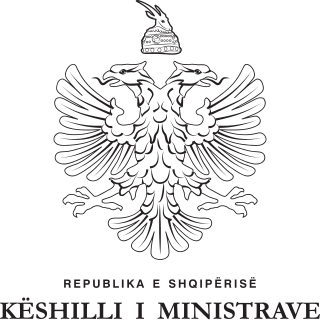Top Qs
Timeline
Chat
Perspective
Council of Ministers (Albania)
Executive body of the Albanian government From Wikipedia, the free encyclopedia
Remove ads
The Council of Ministers (Albanian: Këshilli i Ministrave) is the principal executive organ of the Albanian government. The Council is led by the Prime Minister of Albania and includes 17 other ministers, nominated by the Prime Minister and confirmed by the Albanian parliament. The Council is responsible for carrying out both foreign and domestic policies. It directs and controls the activities of the ministries its members lead as well as other executive state bodies.[1]
The Prime Minister is nominated by the President of Albania based on the proposal of the majority party or coalition in the parliament. The nominee must then secure a vote of confidence in parliament to be appointed. If the parliament does not have confidence in the nominee, the President presents another within 10 days.[b] Once appointed, the Prime Minister presents his policy program and proposed cabinet before the Parliament where the government, as a whole, is confirmed.[2]
The Deputy Prime Minister takes over the functions of the prime minister in his absence.
As of April 2017, after a reshuffle, 50% of the cabinet ministers are women.
Remove ads
Overview
Summarize
Perspective
Rank
Council members are subdivided into three substantial ranks, along with one honorary rank:
- Prime Minister,
- Deputy Prime Minister,
- Ministers, which are the highest-ranking members of the Government
- Deputy Ministers, that assist ministers in specialized areas of their portfolio and
- General Secretaries (Sekretari i Përgjithshëm) that assist ministers in less important areas and occasionally attend sessions of the Council of Ministers.
Role
The Council is responsible to the Parliament of Albania. The Parliament can pass a motion of no confidence or refuse to pass a motion of confidence, forcing the Prime Minister and the Council of Ministers to resign. This has the effect of forcing the Government to be composed of members from the majority political party in the Assembly or to be allied to the majority in a coalition.
Ministers are required to answer written or oral questions put to them by members of Parliament. In addition, ministers attend sessions of the Parliament when laws concerning their departmental portfolios are under consideration. While neither ministers nor the Prime Minister are required to be members of parliament, many often are.
The Council of Ministers can propose bills to Parliament. These government proposals very rarely fail, given the government should, theoretically, always enjoy the confidence of parliament and therefore have a majority for any legislation it would like to pass.
The Council can also unilaterally release binding secondary legislation, known as Decisions of the Council of Ministers (Albanian: Vendime të Këshillit të Ministrave - VKM), based on the powers granted to it in primary legislation passed by Parliament.
Remove ads
History
Summarize
Perspective
With the unilateral declaration of Albania's Independence on 28 November 1912 by the Ottoman Empire, one of the first governing bodies to emerge from the All-Albanian Congress was the formation of the Provisional Government and the Council of Ministers as the highest executive body in the country.[3] However, the government did not last long due to its non-recognition by some of the Great Powers of the time. On 29 July 1913, Austria-Hungary, France, Great Britain, and Italy, together with Greece and Romania as interested parties, agreed to adopt the Organic Statute of Albania (Statuti Organik i Shqipërisë) which would serve as the first constitution of the new state created.[4] The statute sanctioned since in the 1st Article that Albania was a constitutional, sovereign, and hereditary Principality under the guarantee of the six Great Powers. Its formal adoption took place in Vlorë on 14 January 1914. On 22 January 1914, Ismail Qemali, one of the founders of the Albanian state and head of the Provisional Government, was forced to resign and hand it over to the International Control Commission (Komisioni Ndërkombëtar i Kontrollit të Kufinjve) which would serve as the highest executive body until the appointment of the monarch from the Great Powers and his arrival in Albania.[5]
The Statute in Chapter V entitled § Government Bodies sanctioned the central government institutions, as well as their competencies and duties. Article 72 states: The Albanian Government consists of a Council of Ministers headed by a prime minister. While in the next article it described the composition of the council, where there are a total of 4 ministries, which are: the Ministry of Foreign Affairs, the Ministry of Internal Affairs, the Ministry of Finances and the Ministry of Justice, while the prime minister simultaneously exercised also the role of Minister of Foreign Affairs. The PM, as well as all ministers were appointed by the Prince, whose oath before taking office should be taken, as well as the handover of office after resignation. Although the statute sanctioned only 4 ministries, in the first government appointed by Prince Wilhelm, there were more departments than anticipated.[6]
Remove ads
Incumbent Government
Remove ads
Governments of Albania (1912–present)
Remove ads
See also
Notes
- Not including the Office of the Prime Minister
- The quisling Biçaku Government served until October 25, 1944, while the first Hoxha Government, otherwise known as the "Democratic Government of Albania" (a precursor of the Anti-Fascist National Liberation Council) which was a provisional shadow government, started its term two days prior, on October 23.
Remove ads
References
External links
Wikiwand - on
Seamless Wikipedia browsing. On steroids.
Remove ads




























